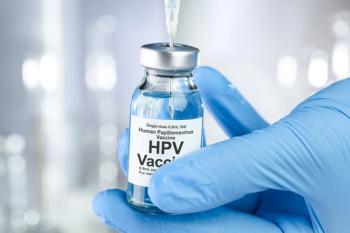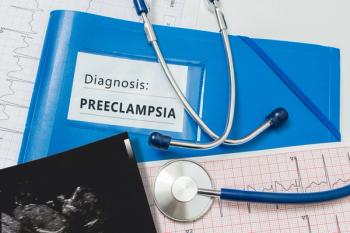
A recent study showcased at the 2024 ACOG Annual Clinical & Scientific Meeting unveils elinzanetant's efficacy in alleviating vasomotor symptoms, sleep disturbances, and enhancing menopause-related quality of life in postmenopausal women.

A recent study showcased at the 2024 ACOG Annual Clinical & Scientific Meeting unveils elinzanetant's efficacy in alleviating vasomotor symptoms, sleep disturbances, and enhancing menopause-related quality of life in postmenopausal women.

A comprehensive analysis reveals strong associations between polycystic ovary syndrome, irregular menstrual cycles, and increased risks of cardiometabolic conditions, underscoring the importance of proactive screening and intervention strategies.

Roche's innovative human papillomavirus self-collection solution offers a breakthrough in cervical cancer screening, providing accessible and reliable testing to combat underscreening rates and increase early detection.

A study highlights how having a primary care physician significantly increases the likelihood of cervical cancer screening among lesbian, gay, and bisexual cisgender women, addressing disparities exacerbated by systemic discrimination and healthcare access challenges.

Explore the latest findings revealing vaccination rates among children aged 9 to 17 years, uncovering demographic disparities and highlighting the crucial role of vaccination in combating human papillomavirus infections and related health risks.

A recent study highlights the heightened risks of maternal and neonatal morbidity and mortality associated with combined cannabis and nicotine use during pregnancy, urging further investigation into their impact on short- and long-term outcomes.

Discover how recent findings highlight the significance of echogenic masses in accurately diagnosing post-pregnancy complications, shedding light on effective management strategies and reducing the need for invasive interventions.

Review some of the top stories from the Contemporary OB/GYN website over the last week, and catch up on anything you may have missed.

A recent study revealed that mail-order pharmacy dispensing of mifepristone for medication abortion proves effective and satisfactory, highlighting a potential avenue for expanding access to reproductive healthcare.

A recent study reveals associations between concomitant histological fetal inflammatory response and adverse neonatal outcomes, urging further investigation into implications.

Dive into the rising prevalence of sexually transmitted infections among adolescents and young adults, exploring educational gaps, vaccination rates, and the imperative need for open conversations between patients and health care providers to combat stigma and enhance preventive care.

As teenagers become sexually active, are they fully educated on contraception and pregnancy?

Elina Melik-Levine, ARNP, highlights the importance of early discussions about fertility preservation, referral pathways, and addressing socioeconomic challenges in cancer care, emphasizing the role of Miami Cancer Institute's onco-fertility program.

A review of 5 studies reveals a significant 1 in 4 incidence of adverse maternal outcomes following uterine conservation in patients with placenta accreta spectrum, underlining the importance of expert multidisciplinary care.

Explore how dequalinium chloride stands as a promising alternative to metronidazole in treating bacterial vaginosis, offering comparable efficacy, safety, and tolerability, as revealed by a recent noninferiority trial.

Discover the findings from a recent study highlighting the need to enhance vaccination rates among pregnant individuals living with HIV, shedding light on key factors influencing vaccine receipt.

Investigating the impact of red blood cell transfusions on peripartum complications and anemia risk highlights the importance of prepartum anemia detection in women diagnosed with placenta accreta spectrum.

A recent shed light on how ethnic minority groups perceive pelvic floor disorders, highlighting barriers to treatment seeking and the importance of raising awareness about available treatment options.

Dive into the intricate landscape of testosterone therapy prescriptions among women with hypoactive sexual desire disorder, revealing diverse patterns in duration, administration routes, and estrogen co-administration.

Dive into the research finding increased risks of postpartum hemorrhage and anemia among women who use higher doses of selective serotonin re-uptake inhibitors during pregnancy.

A recent study highlights the role of weight gain, ferritin levels, and nutritional education in influencing the risk of postpartum depression among pregnant women, urging for proactive measures during routine prenatal care.

Discover the findings of a comprehensive study exploring the efficacy of various treatments for postmenopausal urinary incontinence, shedding light on the current research gap and recommending avenues for future investigation.

Review some of the top stories from the Contemporary OB/GYN website over the last week, and catch up on anything you may have missed.

A recent double-blind, randomized clinical trial revealed a higher clinical pregnancy rate with pioglitazone compared to metformin in polycystic ovarian syndrome patients undergoing in vitro fertilization, suggesting potential for improved outcomes.

A pair of studies from AUA 2024 show neither drinking nor vaping by either parent is associated with significantly increased risk of a spontaneous abortion.

Jenell Stewart, DO, MPH, discusses her team's qualitative research into the STI prevention tendencies and interests of at-risk women.

New data show women of specific race and ethnicity may more be adversely affected by the changing state-level laws on abortion access.

A recent study found breast arterial calcification on mammograms could help predict higher risk of stroke, cardiovascular death, and heart disease in women.

A recent investigation revealed how integrating maternal plasma cell-free DNA profiles significantly refines predictive accuracy in early- and late-onset preeclampsia.

Maternal-fetal medicine specialist Todd Rosen, MD, discusses how quitting smoking during pregnancy affects risks of preterm birth, stillbirth, and preeclampsia, urging simultaneous focus on nutrition to optimize outcomes.